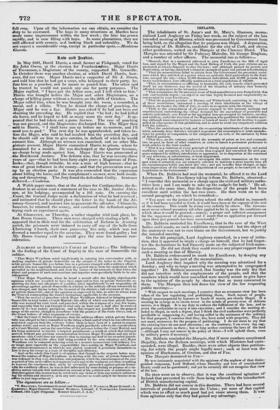_ • • JUDGMENT OF SOMERVILLE'S COURT OF INQUIRY.—The following
is the findiug of the Court of Inquiry in the case of Somerville the soldier.
That Major Wyndham acted injudiciously in entering into conversation with, or winking inquiries of. private Somerville on the subject of the letter in the Dispatch, -while private Somerville WO3 before hint as a prisoner charged with a military offence ; and that this was especially inconsiderate at a perhal when, from the excitement which prevailed in the neighbourhood, and from the nature of the contents of that letter, the sobjs..ct and purpose of such conversations and inquiries were peculiarly liable to be mis- interpreted. • That Major Wyndham, when he heard a recruit offer the highly objectionable opinions which are recorded to have lase: expressed to hint by private Somerville, re- sPecting the duty and allegiance of a soldier, acted injudiciously in not suspending all . proceedings against private Somerville in relation to the military offence wherewith he was charged, and laying before the General of the district a full statement of the case NA private Somerville, and of the opinious so expressed by hint, in order to obtain from the General commanding the distriet instructioes applicable to the occasion. " That the method or procedure which Major Wyndham followed in bringing private - 'Somerville to triaLbefore a Court Martial—the effect of which was that private Sumer- -sine was warned for trial, tried, and punished, within the compass of a very few hours, and especially that he was brought to trial only an hour and a half after he received notice of it—was unduly precipitate, anti in that respect not justified by the general .aisage of the service, though in accordance with the practize of the Scots Greys, and, ati the Court believe, of other regiments of cavalry. " But the Court is further of opinion, that the military offence which private Somer- . wale was alleged to have committed in the riding schooLand of which he was afterwards convicted. appears front the evidence before them to have been of a nature to require serious notice, and such as Major Wyntiliam might justifiably refer to the consideration sof a Court Martial; and on the conviction of the prisoner before the Court Martial, and - his being sentenced to receive a corporal punishtnent—a result at which that tribunal . arrived, without any previous communication between Major Wyndham and any of its embers—this Court does not conceive that in causing one-half of the awarded punish- • anent to be inflicted (the other half being remitted by his own voluntary act), Major - SV-yndham can be censured as having acted in a manner inconsistent with military law . mar usage, more especially as the responsibility then resting on Major Wyndham, and the critical circumstances in which he was placed, remit-red it peculiarly incumbent on Itim to keep his troops in a state of discipline and etTiciency. Alston the whole this Court is of opinion, that though in the respects before men- : Coned the Conduct of Major Wyndham, in dealing with the case of private Somerville, was deficient in that care, discretion, and judgment, which the eircuutstancesof the case required of' him, as the officer in temporary command of the reeiment, vet titers. is nothing to warrant_the conchtsion that, while be ostensibly proceeded against private Somer- wille for a military effence, he was in fact influenced by some feeling or purpose of a vin-
• .4iciive nature towards that individual on licceunt of his political acts or sentiments, or . that throughout this transaction he acted with any views or from any motives unbeeom- • in his station and Character, or in any such manner az could subject his honour as an officer to just impeaclunent."
The signatures are as follow- fir:BRADFORD, Lieutenant-General and President ; J. NICITOLLS,Major-Genend; A. • ICSWPBET,T,. Major-General ; GEORGE BURRELL, Colonel; TOWNSUEND, Lieutenant- Colonel, 14th Light DillgOOLLS. ROBERT GRANT, J. A. G."
- • •


























 Previous page
Previous page